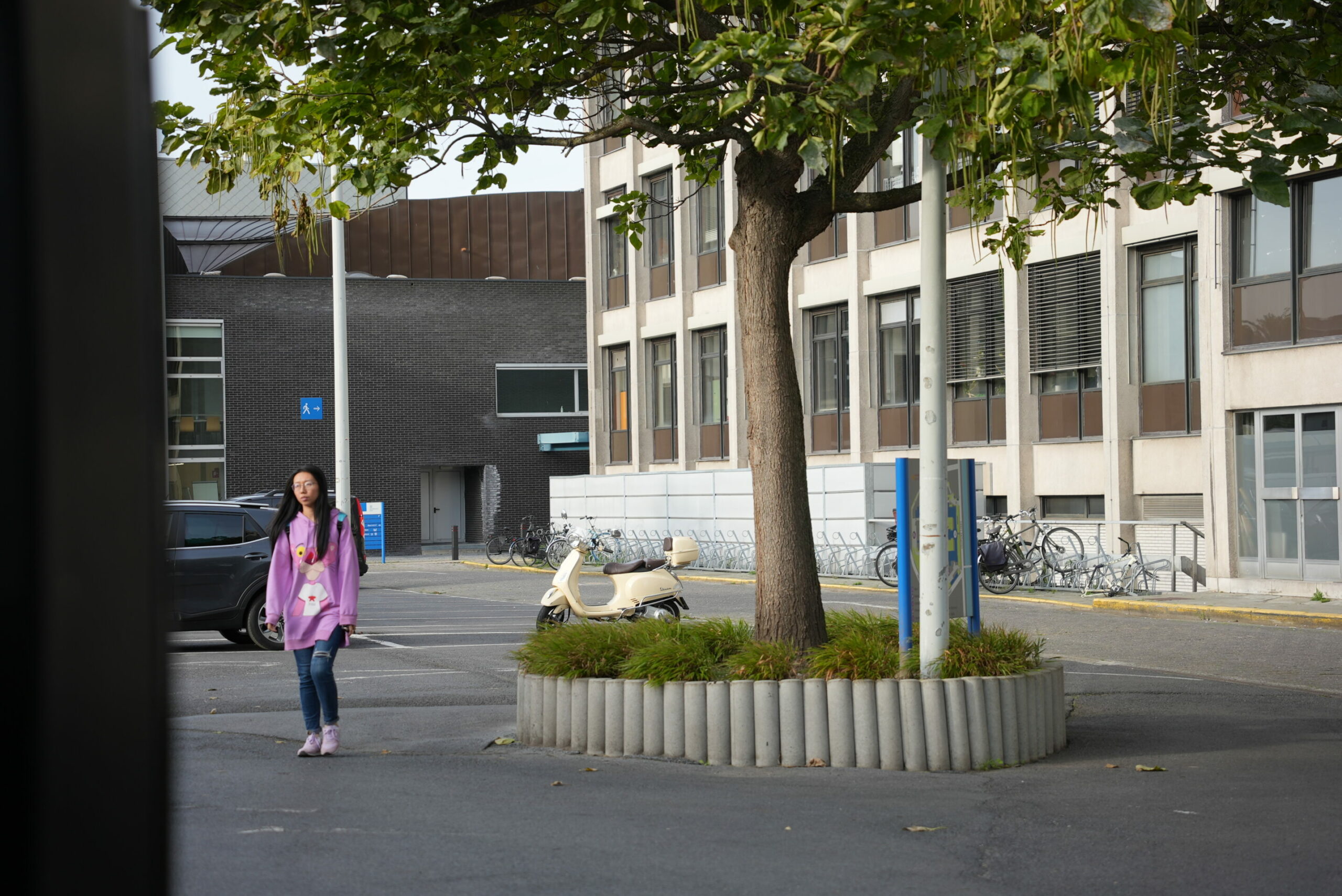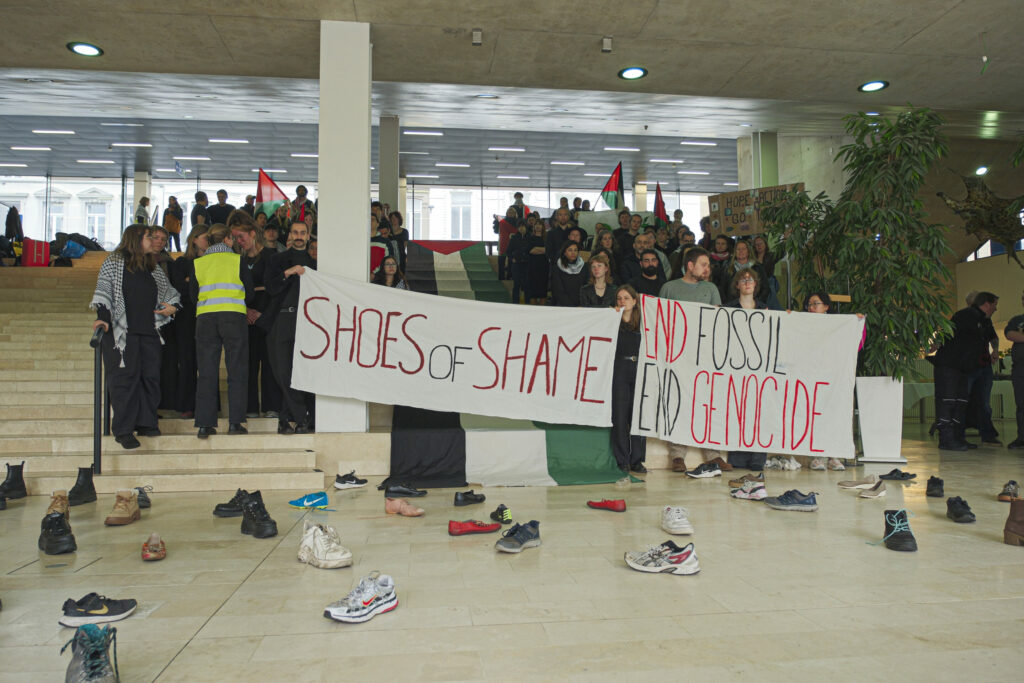Pro-Palestinian student protests have rocked academic institutions in the US and now, students at Belgian universities plan to show their support for the people of Gaza.
Students at Ghent University (UGent) occupied campus on Monday morning and are calling for the Board of Directors to cut ties with Israel as well as make stronger commitments to the green transition. Student organisations 'End Fossil Ghent' and 'Ghent Students for Palestine' have joined forces to protest what they feel is "hypocrisy" from the university regarding both human rights and sustainability.
In a letter sent to the Board of Directors on 24 April, signatories asked the institution to outline two "time-bound action plans": one detailing plans to "cut all collaborations with Israeli institutions complicit in the ongoing ethnic cleansing of Palestinians", and another setting out "effective and binding action to implement [the university's] 2030 transition plans".
The Board of Directors failed to respond to their demands by Friday 3 May and occupation of the campus began on Monday as a result.

UGent students announced the occupation of Friday 3 May. Credit: End Fossil Gent
"We are uniting because we want to call out the hypocrisy of UGent," Joelle (25), Erasmus student and member of 'Ghent Students for Palestine', told The Brussels Times. "They say they are a socially-just university that believes in human rights, but they are not standing against Israel or condemning the genocide."
"They are also not investing in sustainability, budget-wise or education-wise," added Siska (23), a Masters student and member of 'End Fossil Ghent'.
A separate open letter signed by over 400 students and faculty members expresses "deep shock" at the Board of Directors' decision to ignore the Human Rights Commission's advice to sever ties with Israeli institutions. "The silence and lack of transparency regarding the Palestinian genocide are in sharp contrast to the open condemnation of the Russian invasion of Ukraine," they stated, adding that they support the action.
'Gaza and climate go hand in hand'
"Systems of oppression are interconnected and therefore our actions against them need to be interconnected," the students explained. "Supporting Palestine is a climate issue within itself."
A UN-led investigation into the environmental effect of the war in Gaza estimates that at least 100,000 m3 of sewage and wastewater are being dumped daily onto land or into the Mediterranean Sea. In the first two months following 7 October, the conflict produced 281,000 tonnes worth of carbon emissions – 99% of which was attributable to Israeli bombardments and ground invasions.

Credit: Belga / Hatim Kaghat
The student body at UGent has witnessed a progressive slowdown of the university's environmental ambitions. Energy consumption on campus has prevented the institution from staying on track to reduce emissions by 2030 and no measures implemented to mitigate this.
In addition, UGent energy-saving policies no longer align with the 1.5°C target set out in the 2015 Paris Agreement, nor the EU's 2°C target. Students say that the university's savings policies are "unsustainable and anti-social," pointing to a reduction in vegetarian canteen options as one issue.
Furthermore, the institution has taken little concrete action in defence of human rights in Gaza, where thousands of civilians have been injured or killed by Israeli military. The protesters denounce attempts to "outsource" decision-making on the issue to the Committee on Human Rights and Dual Use Research.
They argue that by failing to cut ties with Israeli organisations, UGent has enabled "educide" (all universities in Gaza have been destroyed by Israeli bombardments since October 2023).
Reaction on campus
US student protests – and pro-Palestinian movements in general – are constantly met with accusations of anti-Semitism. Joelle and Siska point out this "recurring issue" and believe it is designed to "distract" from the movement itself.
"Anti-Semitism is something that should be called out when it happens. Within our collective, we have made a point of making sure that no type of discrimination occurs," Joelle explained. "We want this to be a safe place where nobody faces discrimination based on religion, ethnicity, gender and sexual identity."

Ghent University campus. Credit: Belga / Jonas Dhollander
When asked whether or not Jewish students are participating in the action, Joelle and Siska were unsure. "We are uniting as students to tackle injustice. It is not about religion or where you come from. It is about striving for a fairer world."
Neither the Board of Directors nor UGent responded to a request for comment from The Brussels Times.
The campus occupation will last for at least three days, until Wednesday 8 May. "We are well organised, committed and hopeful," Siska said. "But we are also angry that we have to do this in the first place. So far, UGent has not heard our demands but this is our way of making sure we are not left on the sidelines of the decision-making process."

